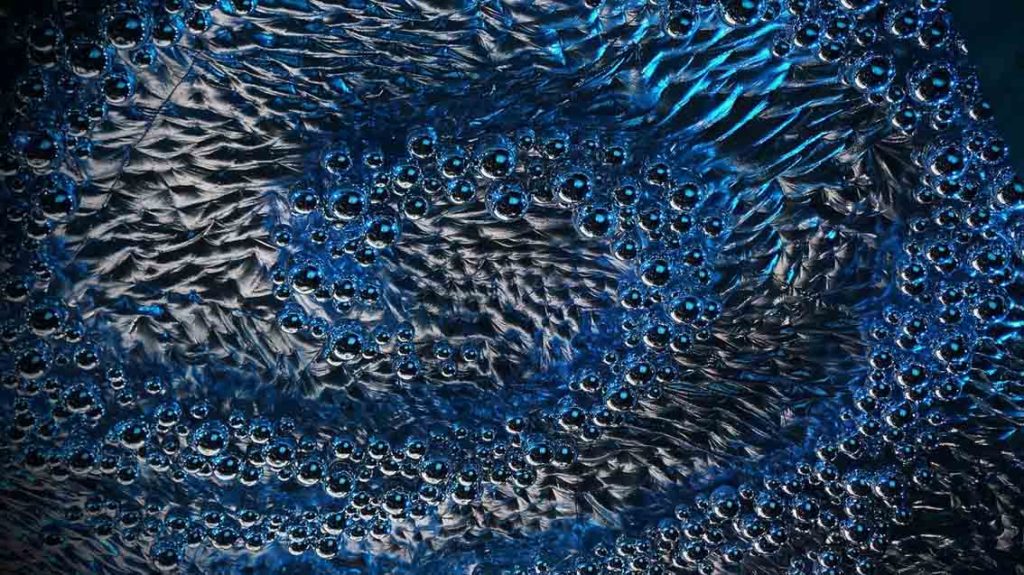Let us continue our study of the Emotional Plane and the myriad effects it has within itself and on the other two principal envelopes of incarnation. Emotional matter responds more rapidly than physical matter to every impulse from the mental world. Consequently, the emotional body of a person, being made of emotional matter, shares this readiness to respond to the impact of thought and thrills, in answer to every thought that strikes it, whether the thoughts come from without, i.e., from the minds of other people, or from within, from the mind of its owner. An emotional body, therefore, which is made by its owner to respond habitually to evil thoughts, acts as a magnet to similar thoughts and emotion forms in its vicinity. Whereas a pure emotional body excludes such thoughts with repulsive energy and attracts to itself thought and emotional essences that exhibit vibrations similar to its own. It must be borne in mind that the Emotional World is full of thoughts and emotions of other people and that these exert a ceaseless pressure, constantly bombarding every emotional body and setting up in it, vibrations similar to their own. We live in a polluted fog of our own collective making.
In addition, there are nature spirits of a low order, which enjoy the coarse vibrations of anger and hatred and throw themselves into any current of such nature, thus intensifying the vibrations and adding fresh life to them. People yielding themselves to coarse feelings can depend on being constantly surrounded by such carrion-crows of the emotional world, who jostle one another in eager anticipation of an outburst of passion.
Many of the moods to which most people are subject, in greater or lesser degree, are due to outside emotional influences. Whilst depression, for example, may be due to a purely physical cause, such as indigestion, a chill, fatigue, etc., even more frequently it is caused by the presence of an emotional entity, who is itself depressed and is hovering around, either in search of sympathy or in the hope of drawing from the subject the vitality, which they lack. This does not mean you are not responsible for your depression, it just means once you start down such a path, others come along for the free ride and help push you further down the slope. A person who, for example, is beside themselves with rage, temporarily loses hold of their emotional body, the desire-elemental becoming supreme. Under such circumstances, the person may be seized upon and obsessed either by a dead person of similar nature or by some evil artificial elemental.
We should take steps to avoid depression, which is a substantial barrier to spiritual progress. If walking the path, it obstructs the communication between the aspirant and their guiding influences. Why this happens is obvious. If you pollute your emotional envelope with low-frequency elementals, vibrations from higher worlds find it difficult to penetrate your emotional envelope to get messages to your brain. Depression causes undue suffering to sensitive people and is responsible for some of the night terrors experienced by children. The inner life of an aspirant ought not to be one of continual emotional oscillation.
Above all things, the aspirant should learn not to worry. Contentment is not incompatible with aspiration. Optimism is justified by the certainty of the ultimate triumph of good, though it is true that if we take into account only the physical plane, it is not easy to maintain that position. Under the stress of very powerful emotions, if a person lets themselves go too far, they may die, become insane, or be obsessed. Such obsession need not necessarily be what we call evil, though the truth is that all obsession is injurious.
An illustration of this phenomenon may be taken from “conversion” at a religious revival. On such occasions, some people get worked up into a condition of such tremendous emotional excitement that they swing beyond the degree of safety. They may then be obsessed by a departed preacher of the same religious persuasion and thus two souls may be temporarily working through one body. The tremendous energy of these hysterical excesses is contagious and may spread rapidly through a crowd. An emotional disturbance is akin to a gigantic whirlpool. Towards this pour emotional entities, whose one desire is for sensation. These are all kinds of nature spirits who delight in and bathe in the vibrations of wild excitement, of whatever character, be it religious or sexual, just as children play in the surf. They supply and reinforce the energy expended by the people engaged in this orgiastic behaviour. The dominant idea at these meetings is usually the selfish one of saving one’s soul. The emotional matter is of a coarse kind and the nature spirits are also of a primitive type. The emotional effect of a religious revival is thus very powerful. In some cases, a person may genuinely and permanently benefit from their “conversion”, but the serious student of esoterics should avoid such excesses of emotional excitement, which for many people are likely to be dangerous. “Excitement is alien to the spiritual life”.
There are many causes of insanity: it may be due to defects in one or more of the vehicles – physical, etheric, emotional or mental. In one variety it is caused by an inaccurate adjustment between the emotional elemental essences and the matter of either the etheric (tertiary) or the mental (secondary) body. In such cases, the person does not recover “sanity” until, after death, when they reach the mental plane, i.e., until the monad withdraws its focus from their emotional body and passes into their mental body. This type of insanity is thankfully rare.
The effect on the emotional body, caused by emotional vibrations of another emotional body, has long been recognised in the East and is one of the reasons why it is advantageous to a pupil to live in close proximity to one more highly evolved than themselves. A yogi master not only may prescribe for their pupil special kinds of exercises or study, in order to purify, strengthen and develop the emotional body, but also by keeping the pupil in their neighbourhood physically, seeks by this close association to harmonise and attune the pupil’s vehicles to their own. Such a teacher has already calmed their own vehicles and accustomed them to vibrate at a few carefully selected rates instead of in a hundred promiscuous frenzies. These few rates of vibration are very strong and steady and each day and night, whether they are sleeping or waking, they play unceasingly upon the vehicles of the pupil and gradually raise them to their teacher’s frequency.
For similar reasons, an Indian, who wishes to live a higher life, retires to the jungle, as a person from other cultures withdraws from the world and lives as a hermit. Such a student has at least breathing space and rest from the endless conflict caused by the perpetual battering on their vehicles from other people’s feelings and thoughts. This allows them to find time to think coherently. The calm influences of Nature are also to a certain extent helpful. Somewhat analogous are the effects produced on animals, which are closely associated with human beings. The devotion of an animal to the master whom they love and their mental efforts to understand their master’s wishes and to please them, enormously develop the animal’s intellect and their power of devotion and affection. In addition to this, the constant play of the owner’s vehicles on those of the animal greatly assists the process and thus prepares the way for the animal to individualise and become a human entity on the next chain.
It is possible, by an effort of will, to make a shell of emotional matter on the periphery of the emotional aura. This may be done for three purposes: (1) to keep out emotional vibrations, such as anger, envy or hatred, intentionally directed at one person by another; (2) to keep out casual vibrations of a low type, which may be floating in the emotional world and impinge upon one’s aura; and (3) to protect the emotional body during meditation. Such shells do not usually last for long but need to be frequently renewed if required for any length of time. I always call around myself a shell of blue light, when I pretend to meditate. Such a shell would, of course, keep vibrations in as well as out. The student should therefore make the shell only of the coarsest emotional matter, as they will not wish to keep away, or to prevent from passing outwards, vibrations in the higher types of emotional matter. I let my devas sort that issue out.
It will be recollected that a person’s emotional body consists not only of ordinary emotional matter but also of a quantity of elementals, constructed from this emotional matter. During the person’s life, this elemental is segregated from the ocean of similar matter around the envelope and for all purposes becomes for that time what may be described as a kind of artificial elemental i.e., a kind of semi-intelligent separate entity known as the Desire-Elemental. The Desire-Elemental follows the course of its evolution downwards into matter without any reference to, or any knowledge of, the intention of the persona to whom it happens to be attached. Its interests are thus diametrically opposed to those of the persona, as it is seeking ever stronger and coarser vibrations. Hence the perpetual struggle described by St.Paul as “the law in the members warring against the law of the mind”. Furthermore, finding a resonant association with the mental matter of the person’s mental envelope brings to this desire-elemental more vivid vibrations. It endeavours to stir up the mental matter into sympathy with it and to induce the person to believe that they desire the sensations, which it desires.
Consequently, it becomes a sort of tempter. Nevertheless, the desire elemental is not an evil entity. It is not an evolving entity at all, having no power of reincarnation. It is only the essence of which it is composed, which is involving. Nor has this shadowy being any evil designs upon the person, for it knows nothing whatever of the person of whom, for the time, it forms a part. It is thus in no way a fiend to be regarded with horror, but is as much a part of the divine life as the person themselves, though at a different stage of its unfoldment.
It is a mistake to imagine that by refusing to gratify the desire-elemental with coarse vibrations, a person is thereby checking its “evolution”; this is not the case. By controlling the passions and developing higher qualities, a person drops the lower and helps to evolve the higher types of essence: the lower kinds of vibrations can be supplied by an animal, even better than by a human, whereas no one but a human can evolve the higher type of essence.
All through life a person should fight against the desire-elemental and its tendency to seek for the lower, coarser physical vibrations, recognising quite clearly that its consciousness, its likes and dislikes, are not their own. The person has created it and should not become a slave to it, but learn to control it and realise themselves as separate from it. We will return to this topic in a later presentation. Next time, we will discuss the third and final life, the Mental Life.


